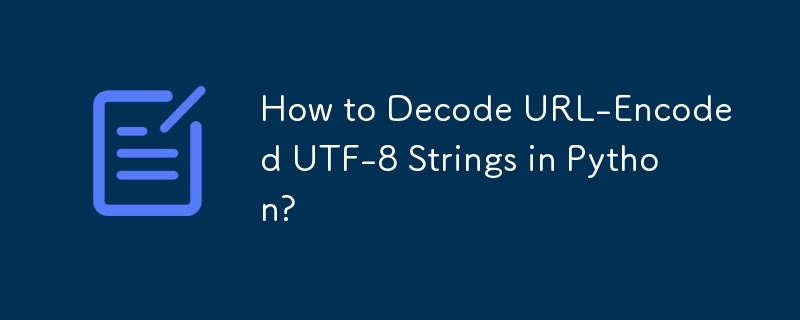

Decoding URL-Encoded UTF-8 Strings in Python
When working with URLs, you may encounter strings that have been encoded using UTF-8 and escaped with URL quoting. To extract the correct data from these strings, you need to decode them.
In Python 2.7, you can use urllib.unquote() to decode URL-encoded data. However, this method returns bytes, so you need to decode them further:
<code class="python">from urllib import unquote
url = unquote(url).decode('utf8')</code>In Python 3 and above, the urllib package has been split into urllib.request, urllib.parse, and urllib.error. To decode URL-encoded data, you should use urllib.parse.unquote():
<code class="python">from urllib.parse import unquote url = unquote(url)</code>
This method handles both URL encoding and UTF-8 decoding, giving you a unicode string as the result.
For example:
<code class="python">>>> from urllib.parse import unquote >>> url = 'example.com?title=%D0%BF%D1%80%D0%B0%D0%B2%D0%BE%D0%B2%D0%B0%D1%8F+%D0%B7%D0%B0%D1%89%D0%B8%D1%82%D0%B0' >>> unquote(url) 'example.com?title=правовая+защита'</code>
By using urllib.parse.unquote(), you can easily decode URL-encoded UTF-8 strings, ensuring that you obtain the correct data.
The above is the detailed content of How to Decode URL-Encoded UTF-8 Strings in Python?. For more information, please follow other related articles on the PHP Chinese website!
 What is digital currency
What is digital currency
 The difference between windows hibernation and sleep
The difference between windows hibernation and sleep
 mybatis first level cache and second level cache
mybatis first level cache and second level cache
 python merge two lists
python merge two lists
 What types of system architecture are there?
What types of system architecture are there?
 How to use the decode function
How to use the decode function
 What are the linux shutdown and restart commands?
What are the linux shutdown and restart commands?
 WiFi is connected but there is an exclamation mark
WiFi is connected but there is an exclamation mark




